Search
Showing 10 of 1954 results for NARSC 2016 conference registration fees student pre advance late July 2016
-
ENZ invites proposals to establish New Zealand Education Centres globally
The centres will deliver education programmes for students progressing onto further study with New Zealand education providers, and act as pathways for greater education, cultural and diplomatic engagement between New Zealand and partner countries.
The centres will receive support from New Zealand universities, ENZ design and marketing packages, and have opportunities to host events, promotions and student mobility activities.
“In developing New Zealand Education Centres we are extending our support for international students offshore, and providing flexibility in how and where they experience a high-quality New Zealand education” ENZ Chief Executive Grant McPherson said.
“The establishment of New Zealand Education Centres will support both the Government’s International Education Recovery Plan and the goals of the New Zealand International Education Strategy aiming for a more globally connected New Zealand.”
Interested organisations can contact John Laxon, Director Global Education Partnerships (nzcentres@enz.govt.nz) to receive further information on the establishment process.
Download the NZ Centre Proposal Summary Information 2021 here.
Proposals are due by Wednesday 25 May, with centres being established and open for initial student intakes by 2022.
-
From the CE: Building Back Better: How we’re balancing our efforts on the road to recovery
The current COVID-19 surges are a reminder that we face a long road to recovery and rebuild of the international education sector, a point highlighted during ENZ’s recent appearance at the New Zealand Parliamentary select committee.
ENZ remains strongly focused on the goals of the New Zealand International Strategy 2018-2030: sustainable growth, an excellent education and student experience, and increased global citizenship for New Zealand students. It is important that we rebuild with those goals front of mind.
At ENZ, we are fully committed to supporting other agencies and the sector in progressing the re-entry of students. ENZ staff have been seconded to other government agencies here and overseas to support these initial steps towards the recovery.
We have been increasingly asked about the place of ‘transformation’ within our recovery. The simple answer is it complements and reinforces our ability to attract students to New Zealand in the future.
This work enables us to connect with education partners and students that we otherwise wouldn’t reach. The work is about growing the pie for all the international education sector and for New Zealand, rather than competing with existing efforts.
Through this work we will collectively be more competitive in attracting students as student mobility opportunities emerge, and in anticipating the accelerating changes in the delivery of and learner engagement with education globally.
Although each part of the Government’s Recovery Plan may progress in different ways at different times, we are committed to progressing them collectively and for the benefit of our sector as a whole.
Nā tō rourou, nā taku rourou, ka ora ai te iwi
With your food-basket, and my food-basket, the people will be well.
Ngā mihi,
Grant McPherson
Chief Executive Education New Zealand Manapou ki te Ao
-
Around the world in five
Global
New Zealand
Canada
Generous Canada now No. 1 country for foreign students, survey says
United Kingdom
United Kingdom ‘much more attractive’; New Zealand receives a ‘glowing review’
India
India overtakes China as largest source country for international students
-
International Pathway Programme for Indonesian business students
The partnership, named the International Pathway Programme (IPP) in Business, will allow students in Indonesia to complete their first year of study with i3L School of Business, and then progress directly into the second and third year of study under the University of Canterbury’s Bachelor of Commerce programme.
ENZ’s Regional Director, Asia, Ben Burrowes, said the partnership marks an important milestone in New Zealand’s relationship with Indonesia in the education sector.
“We look forward to witnessing how the skillsets and knowledge of both student communities will merge to create a more well-rounded and enriching learning experience. We highly value our international education partners, and we hope to establish more such partnerships in Indonesia,” Mr Burrowes said.
i3L School of Business’s Vice Rector of Admissions, Marketing and Institutional Development, Dr Tjong Budi Santoso, said the launch of the partnership is momentous for the institution.
“It has always been a goal of ours to empower students by presenting them with the opportunity to further their studies in International Business in some of the world’s best universities, such as University of Canterbury. This marks the first time that we are partnering with an esteemed New Zealand university, and we look forward to building our working relationship with New Zealand and its educational institutions even further.”
University of Canterbury Business School’s Internationalisation Director, William Shannon, commented, “The importance of having international experience and connections is highly crucial today as more business is conducted on a global scale.
“We hope that both student communities will benefit greatly from this programme and can contribute even further to the future economy and society of both New Zealand and Indonesia.”
This education pathway to the University of Canterbury is now open for applications with the first intake starting in September 2022.
-
SIEBA launches Schools Global Citizenship Pilot Programme
A network of 20 schools will take part, receiving professional advice and support to create, introduce and embed global citizenship strategies and initiatives across their schools.
SIEBA’s recent report on international business recovery for schools highlighted global citizenship education as one of three key areas expected to underpin business recovery and the future of international education, both within New Zealand and globally. The other two areas are sustainability/climate action, and growth in school-to-university pathways.
Global citizenship programmes contribute to a better international student experience, build understanding and support for international education, and enrich the value proposition that schools offer both domestic and international students.
Image above: Japanese and Kiwi students discovering science together at Awatapu College in Palmerston North
“Global citizenship education (GCED) has the potential to bring local and international students together through a focus on global issues, and in development of global competencies. International students and parents are increasingly looking for schools that can demonstrably deliver GCED within the educational experience," the report says.
The pilot programme will be delivered in collaboration with the Centres of Asia-Pacific Excellence. The schools involved will draft Global Citizenship strategies linked to a range of programmes throughout the school, including learning content and teaching approaches, co-curricular programmes, professional learning and development, and student-led initiatives. They will examine how Te Tiriti o Waitangi and Te Ao Māori will underpin their global citizenship strategies. Schools will start local, this will be a multi-year journey, and the result will look different in every school.
Developing global citizens is also one of the overarching goals of the New Zealand International Education Strategy.
-
Around the world in five - September 2022
International
Ardern welcomes students back to New Zealand
Amended NZ education strategy released
Finding value in technology for education
New Zealand university plans biggest ever job cuts
Gender gap ‘impossible to overcome’ without ‘intervention’
NZ: Victoria partners on TESOL in Vietnam
Linguistic racism can take a high toll on international students
New Zealand
Watch: PM Jacinda Ardern on Covid-19 Rules, Construction Industry and International Students
Tauranga education showcase returns to South Korea
Education NZ’s plan to woo Asian students
ESOL outdated: English for speakers of other languages guilty of othering
Return of international students marks new era for sector
International students: How changes in Asia could affect how young Kiwis learn
Australia
Western Australia government launches Agent Incentive Scheme, extends student bursaries
China
China will again welcome international students
Colombia
NZ Embassy welcomes Colombia agents
India
University of Auckland announces scholarships worth NZ$1.5 million for Indian students
Rural Indians join rush to study abroad as prospects dim at home
Indonesia
9 Indonesian women complete Girls in Tech scholarship programme
Italy
Japan
Government sets goal of 100,000 students going abroad by 2027
Malaysia
Many Malaysians returned as experts after New Zealand education, says High Commissioner
New Zealand’s University of Waikato keen to collaborate with Malaysian universities
South Korea
New Zealand, Korea well placed in digital ecosystem to work together: ambassador
Winners of Student Reporter Contest recognized at ceremony
Thailand
Rose Garden Rangsit School joins hands with ENZ to organize coding camp
Vietnam
Quang Tri teacher receives full scholarship from New Zealand Education Agency
University of Auckland supports students from South-East Asia
-
Important update: passport requirements for temporary visa applicants offshore
Immigration New Zealand has announced a change to passport requirements that affect a number of temporary visa applicants offshore. This change is in effect now.
The change means that people applying from offshore for a student, visitor or work temporary visa only need to send Immigration New Zealand a high-quality scan of their passport, not a physical copy.
An Immigration Officer may still ask for a physical passport if they consider it necessary for the application. This will be on a case-by-case basis.
This is a temporary measure to help with visa processing. People applying for a student visa or group visitor visa through the Immigration Online form will currently receive an automated letter asking for a physical passport to be submitted. This is not required, and Immigration New Zealand is working to update the letter to reflect the change in requirements.
Visit Immigration New Zealand to learn more about passport requirements.
-
Connecting careers in Bay of Plenty and Waikato
This new online resource hub supports international secondary school students to pursue tertiary education and employment opportunities in the regions.
Secondary schools can use the tool to showcase the exciting range of opportunities in the students’ backyard. It encourages them to explore, plan, connect and succeed.
International students staying in the regions bring many benefits, including addressing skill shortages in key industries where skilled workers are in high demand, increased spending and promoting global citizenship and diversity.
Education Tauranga regional relationship manager Melissa Gillingham says providing a comprehensive international student journey plan is becoming increasingly important.
“This allows students and their parents to see the opportunities that exist in the regions, from the school sector, into the tertiary sector and through to employment,” she says.
“Excellent existing relationships across all education sectors within our region allowed us to hit the ground running, creating, delivering and promoting our international student journey plan. We would like to thank all our stakeholders for their support.”
Education Tauranga partnered with Education New Zealand Manapou ki te Ao, Te Waka and Rotorua NZ to help bring Career Connect to life.
-
Education delegation to Asia
One of the real highlights of the trip for the Minister was meeting New Zealand alumni, compelling ambassadors for a New Zealand education. Vikra Ijas is a former University of Auckland student and co-founder of Kitabisa, a crowd-funding platform in Indonesia. His story of schooling and tertiary study in New Zealand leading to the establishment of his fundraising platform for social good in Indonesia was truly inspiring.
South Korea
The programme in South Korea included the Minister’s speech to the Korean International Education and Career Fair. This is the largest international education fair in South Korea, with an estimated 25,000 attendees. More than 40 New Zealand providers were present, many exhibiting on the Education New Zealand country pavilion.
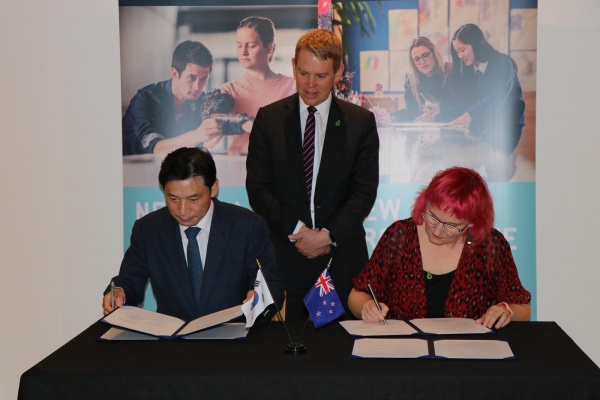
The Minister also witnessed the signing of the Education New Zealand-Incheon Education Cooperation Arrangement (ECA). The formal partnership, based on the ECA, has been designed to establish and strengthen communication ties between ENZ and the Incheon East Asia Global Education Institute, to identify creative areas of potential collaboration and to open up more learning possibilities for our institutions and students.
Minister Hipkins also attended an event with New Zealand education agents, alumni and institutions to celebrate the 60th diplomatic anniversary between South Korea and New Zealand.
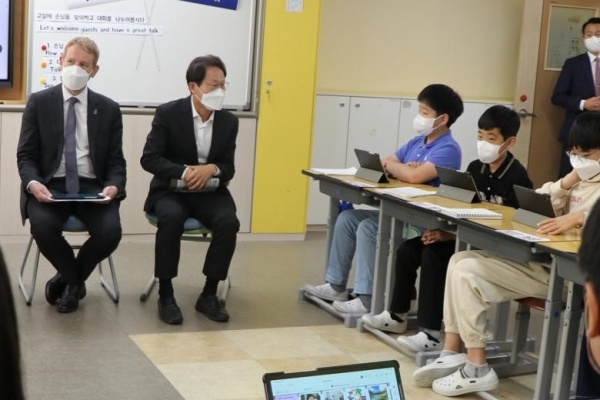
One of the highlights of the Minister’s visit to South Korea was on 24 October 2022, when the education delegation visited Kyodong Elementary School, the oldest school in South Korea (established in 1894). The delegation toured the school and interacted with the students who are participating with Raumati Beach School in the New Zealand - Korea digital cultural exchange programme supported by Education New Zealand and facilitated by Learn English Live.
Indonesia
The programme in Indonesia included bilateral meetings with the Secretary General of the Ministry of Education and Culture, the Coordinating Minister for Human Development and Culture, the Minister for National Development Planning and the ASEAN Secretary-General. The Minister also met with the President Director of Lembaga Pengelola Dana Pendidikan (LPDP), the key Indonesian government scholarship agency, to discuss opportunities to promote New Zealand as a destination for the awardees while further expanding the number of New Zealand institutions eligible to receive the scholarship students.
As well as the visit to Kitabisa, the Minister also had the opportunity to meet a group of Kiwi students interning at WIR Group (Metaverse) in Jakarta under the Prime Ministers Scholarship for Asia. The students were thriving on the unique opportunity and wringing every bit of experience from their internship at WIR. He also launched KIWI Challenge 2022, the annual entrepreneurship competition for Indonesian high school students organised by Education New Zealand.
As with South Korea there was a reception in Jakarta with agents, alumni, PMSA students and key stakeholders.
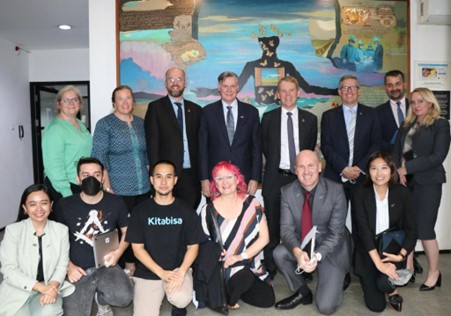
Singapore Visit
The focus of the Singapore leg of the visit was signing the refreshed Education Cooperation Arrangement with the Minister of Education from Singapore. The arrangement, first signed in 2018, confirms New Zealand’s commitment to engaging with Singapore on education cooperation initiatives in key policy areas including early childhood education, digital classrooms/blended learning, vocational and lifelong learning, sports and physical education, STEM uptake, and the development of mental health support programmes for the sector.
The Minister also made several institutional visits. The first was to the Institute of Technical Education Central College to understand where Institutes of Technical Education fit within Singapore’s education ecosystem; and the second was the Public Service Sector and Civil Service College. The purpose of this visit was to understand the role that the Civil Service plays in designing, developing and delivering programmes for the Public Service.
The final visit of the trip was to the Centre for Strategic Focus. The Centre is part of the Strategy Group in the Prime Minister’s Office which was set up to focus on whole of government strategic planning and prioritisation.
“The messages around the strong commitment of the New Zealand government to international education were very well received by our partners,” says ENZ Regional Director Ben Burrowes. “Whether via student mobility, international education partnerships or systems level dialogue, it’s exciting to see the interest generated through New Zealand stepping up its international engagement once again.”
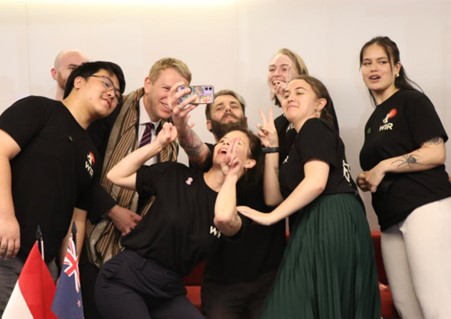
-
Hands-on environmental studies for US students
EcoQuest Education Foundation is a charitable trust and PTE based in Whakatīwai, with strong connections to Ngāti Paoa and Ngāti Whanaunga.
“We had a wonderful day on the Wharekawa Coast,” says Ria Brejaart, EcoQuest’s Academic Director.
“Led by mana whenua, our students welcomed special guests US Consul General Sarah Nelson, Director of USA Study Abroad Heidi Manley, and Senior Education Advisor US Consulate General, Katie Sleeman. EcoQuest’s Board of Trustees and academic associates also attended the event, along with other key supporters.
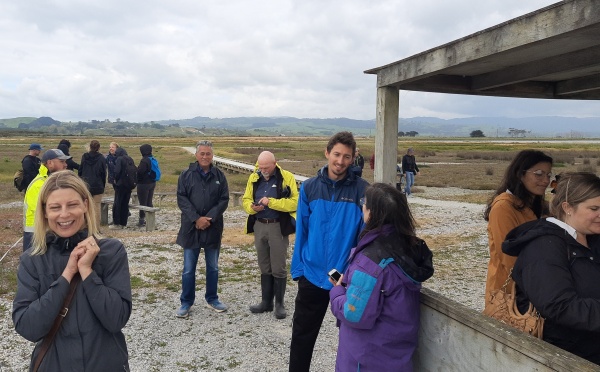
EcoQuest team and manuhiri at the bird hide.
“It was a great way to celebrate both the return of our US students after a long Covid-19 hiatus, and our enduring relationships with our collaborators and supporters. It felt particularly apt to be on the shores of Tikapa Moana, where the kuaka (bar-tailed godwits) return each year from Alaska.
“The morning of observing birds on the shell-banks was followed by a visit to Pūkorokoro Miranda Shorebird Centre, for a talk by Keith Woodley, Centre Manager. We then returned to EcoQuest where we marked the occasion by presenting Tū Ngātahi pins to all our students, on behalf of Education New Zealand Manapou ki te Ao.”
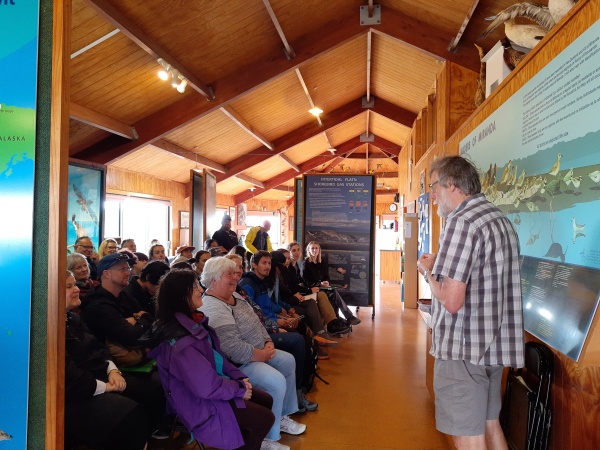
A presentation from Keith Woodley (Pūkorokoro Miranda Shorebird Centre Manager). Front row left, Beth Coleman (EcoQuest Board Chair) and Sarah Nelson (US Consul General).
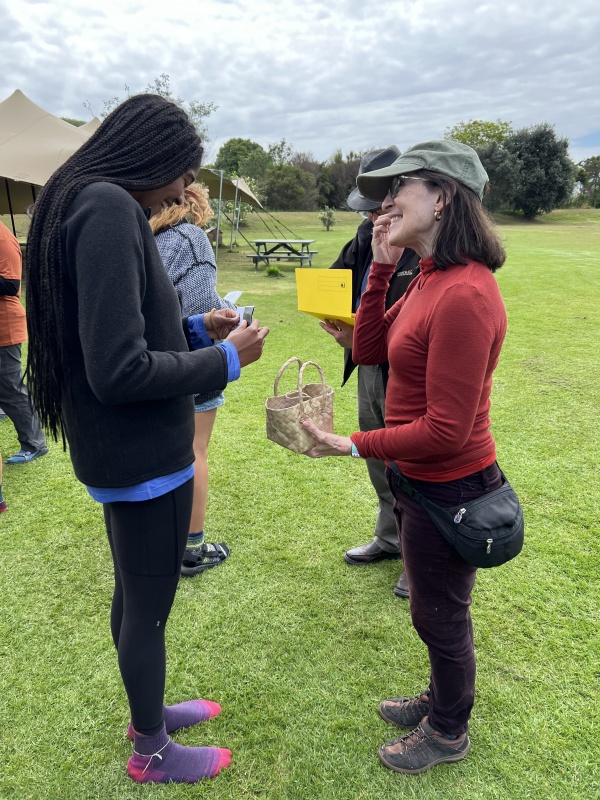
Beth Coleman (EcoQuest Board Chair) and Jono Clark (Director) presented Tū Ngātahi pins to the students.
The eighteen students are from the University of New Hampshire (UNH), Cornell University, University of Michigan, and Colorado State University. They are participating in a fifteen-week residential semester programme with EcoQuest, which offers undergraduate programmes in partnership with UNH. Students gain credits for their undergraduate degrees back home.
“Within the international education sector, EcoQuest contributes high-quality, niche programmes,” says Alana Pellow, Business Development Manager at ENZ.
“These international student programmes align well with New Zealand’s areas of excellence in ecology, restoration ecology, environmental policy, and sustainability. EcoQuest students undertake real-time research for many different collaborators including iwi, NGOs and trusts, councils, private land owners and the Department of Conservation. Academic and scientific rigour are the basis for these unique hands-on learning opportunities.”
“EcoQuest also contributes to international thinking around indigenous approaches to sustainability, through inclusion of elements of Te Ao Māori and mātauranga in its education and research activities.”
The current students are part of Cohort 4, the final cohort of international students to be given entry to New Zealand through a border exception earlier this year. Cohort 4, which was jointly led by ENZ and the Ministry of Education, saw 5,000 international students from 109 different countries nominated for student visas, before New Zealand’s borders fully reopened in August.

